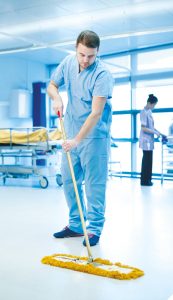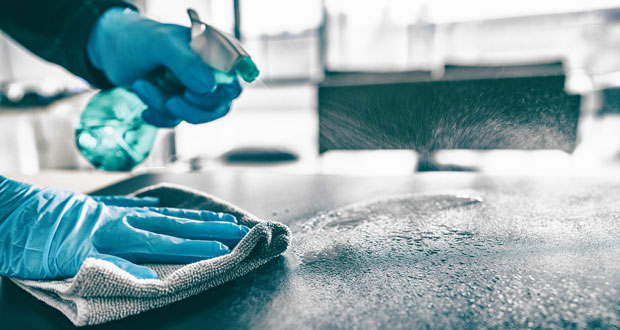CLEAN RESPONSE
When it comes to the national approach to cleaning and hygiene during COVID, Jim Melvin, Chair of the British Cleaning Council said: “What has been well done was the reaction of both cleaning and hygiene operatives and contractors despite a lack of clear direction or, indeed, conflicting direction from Government.
“The commitment and bravery of our operatives deserved the highest possible commendation and instead they received no official recognition in the commercial world as being key workers when the reality was that they were frontline in getting buildings hygienically clean for key workers. We even had evidence of where machinery engineers in certain sites were correctly recognised as key workers but the cleaning staff who operated the machines were not!
“The evidence given to the APPG highlighted a number of areas where things could have been, and must be done, differently, with the key overall message being that the Government needs to recognise the vital, professional, skilled, frontline role of the cleaning and hygiene industry operatives and work closely with us to help prepare for any future pandemic or new variant.
“The public, as was demonstrated in surveys, will be healthier, happier and safer in the future if cleaning and hygiene is recognised as a key, frontline service with a vital role in terms of public health.”
Paul Ashton, Chairman of the Cleaning & Support Services Association (CSSA) was also disappointed at the lack of recognition for front-line teams and inconsistent messaging which he says highlighted a lack of understanding by the Government.
“Actions speak louder than words and the failure to award cleaning and hygiene operatives with key worker status demonstrated a deep-rooted lack of understanding, underpinned by their continued ‘low-skilled’ rhetoric.”
He believes that a key lesson for a future crisis is in, “ensuring that there is a preparedness team established which consists of the relevant industry representatives with the ability to step up when needed. Formal recognition, access to training and a structured behavioural change strategy will ensure that we do not repeat the previous failings.”
 Dr Jyotsna Vohra, Director for Policy and Communications at the Royal Society for Public Health says the pandemic “did result in a wider understanding of hygiene and the need for it amongst the public, a greater awareness of how and when to use hygiene products and the ability to call on experts on cleaning and hygiene.”
Dr Jyotsna Vohra, Director for Policy and Communications at the Royal Society for Public Health says the pandemic “did result in a wider understanding of hygiene and the need for it amongst the public, a greater awareness of how and when to use hygiene products and the ability to call on experts on cleaning and hygiene.”
However, what she sees as unsuccessful is there being “no clear mandate on some key areas such as ongoing ability to wear masks and currently no information on why some guidance/practises should still be followed.”
She also argues that there is “a need for timely clear and consistent messaging that is based on the evidence and expert experience and to know that not all experts are scientists”.
JOINT INITIATIVE
One of the key recommendations of the report is the establishment of a joint Government-industry preparedness team. Dr Vohra believes this could comprise: “The Director of Public health and other front-line public health workers, an epidemiologist, behavioural insight teams and inequalities experts to ensure messaging was appropriate.”
While Paul Ashton says, “The CSSA would welcome the opportunity to be involved as a key communication channel to ensure front-line service providers receive consistent guidance, information and messaging;” he says, “the BCC is the natural choice as the authoritative voice of our industry. It is of paramount importance that the Government engage with sector specialists who have the knowledge when it matters most.”
Under the auspices of the BCC says Melvin: “All facets of the industry could as one, produce a list of experts whose associations and companies would be prepared to allow the specific individuals to work with Government on (a) procurement of PPE, chemicals, machinery requirements, resources, and innovative procedures within the marketplace, (b) cleaning methodology and skills required in terms of delivery, training and indeed specialist requirements on a qualified on experienced basis, (c) stock, stock replenishment, stock projections and logistics for all required or projected products (d) innovation, solutions, technology, science, public health/HSE requirements and scientific confirmation of clean. I am sure there are a huge number of additional areas across our very diverse industry.”





